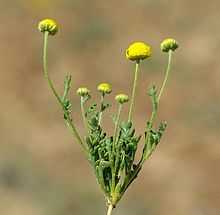Cancrinia
| Cancrinia | |
|---|---|
 | |
| Cancrinia discoidea | |
| Scientific classification | |
| Kingdom: | Plantae |
| (unranked): | Angiosperms |
| (unranked): | Eudicots |
| (unranked): | Asterids |
| Order: | Asterales |
| Family: | Asteraceae |
| Subfamily: | Asteroideae |
| Tribe: | Anthemideae |
| Genus: | Cancrinia Kar. & Kir. |
| Type species | |
| Cancrinia chrysocephala Kar. & Kir. | |
Cancrinia is a genus of flowering plants in the aster family, Asteraceae.[1][2] They are native to central Asia, where they are distributed in China, Mongolia, and Russia.[3]
These are compact, woolly-haired perennial herbs and subshrubs. The leaves are alternately arranged or clustered, sometimes densely. Flower heads are solitary at the tips of the stems or arranged in inflorescences. The hemispherical or cup-shaped head is lined with 3 or 4 rows of phyllaries that sometimes have dark margins. It contains tubular yellow disc florets. The fruit is an achene tipped with lance-shaped scales like a pappus.[3]
C. discoidea is used as a medicinal remedy for inflammation and other conditions.[4]
- Cancrinia angrenica - Tajikistan
- Cancrinia chrysocephala - Altay, Kazakhstan, Xinjiang
- Cancrinia discoidea - Altay, Irkutsk, Uzbekistan, Kazakhstan, Tibet, Gansu, Xingiang, Mongolia
- Cancrinia karataviensis - Kazakhstan, Tajikistan, Kyrgyzstan
- Cancrinia krasnoborovii - Siberia
- Cancrinia lasiocarpa - Gansu, Mongolia, Ningxia
- Cancrinia litwinowii - Xinjiang
- Cancrinia maximowiczi - Gansu, Xingiang, Mongolia, Qinghai
- Cancrinia pamirica - Tajikistan
- Cancrinia rupestris - Turkmenistan
- Cancrinia tianschanica - Altay, Kazakhstan, Xinjiang, Uzbekistan, Kyrgyzstan
- Cancrinia tripinnatifida - West Himalaya
References
| Wikimedia Commons has media related to Cancrinia. |
- ↑ Karelin, Grigorij Silyč & Kirilov, Ivan Petrovich. 1842. Bulletin de la Société Impériale des Naturalistes de Moscou 15: 124-125 in Latin
- ↑ Tropicos, Cancrinia Kar. & Kir.
- ↑ 3.0 3.1 3.2 Cancrinia. Flora of China 小甘菊属 xiao gan ju shu .
- ↑ 4.0 4.1 Su, J., et al. (2011). Evaluation of the in vivo anti-inflammatory activity of a flavone glycoside from Cancrinia discoidea (Ledeb.) Poljak. EXCLI Journal 10, 110-16.
- ↑ Flann, C (ed) 2009+ Global Compositae Checklist
- ↑ Cancrinia. The Plant List.